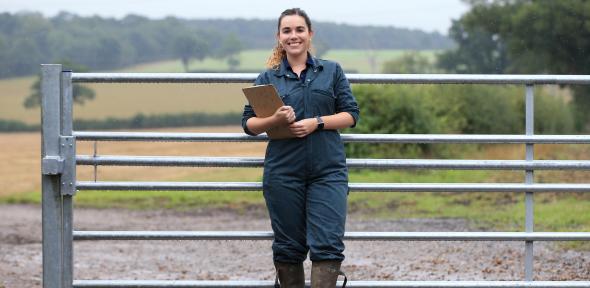
Submitted by Yolibeth López ... on Fri, 24/06/2022 - 11:50
Congratulations to Harriet Bartlett, 2017 cohort PhD student on the BBSRC DTP programme, for publishing the Research Article ‘Understanding the relative risks of zoonosis emergence under contrasting approaches to meeting livestock product demand’ in Royal Society Open Science.
To read the full article, please click here.
The research findings were also reported by The Guardian.
Intensive farming may actually reduce risk of pandemics
Scientist evaluated the evidence that intensive livestock farming is causing pandemics, with surprising results. They find that intensive livestock farming could actually reduce the risk of future pandemics, compared to non-intensive farming.
- Non-intensive (“Extensive”) farms require much more land than intensive farms to produce the same amount of food. This means that a widespread switch to extensive farming could drive substantial habitat loss, bringing livestock and farmers into greater contact with wildlife that could host the next pandemic virus and meaning they are more likely to be infected (something called ‘spillover’).
- However, animals in intensive farms are kept far closer together, meaning that if a disease does get in, then it is more likely to ‘takeoff’ and spread rapidly.
- Which type of farming is riskier depends on the balance between the greater chance of spillover in extensive farms and the greater risk of takeoff in crowded intensive farms.
- Worryingly, the scientists found that we simply lack the evidence to conclude which way of farming is least risky and that there is evidence that the move away from intensive farming might actually increase the risk of pandemics.
- More research is urgently needed before changing policies or incentivising a particular type of farming.
Globally, we are now producing four times more meat than we did in the 1960s (1). Most of our meat, eggs and dairy now come from intensive farms, but such farms are thought be risky due to their crowded conditions which increase the chance of diseases ‘taking off’ and spreading rapidly.
However, intensive farms need less land than extensive (e.g. ‘free range’) farms to produce the same amount of food – both to grow their feed and to rear their animals. This is key because growing demand for livestock products has caused dramatic habitat loss, which means we are now farming in places where livestock and people are coming into frequent contact with wildlife. This contact with increasingly disturbed, stressed, and infected wildlife makes the spillover of zoonotic viruses into people or livestock more likely.
If we were to switch from the current system to one based on extensive farming, we would need substantially more land to meet demand – resulting in the conversion of habitat roughly the size of Brazil and India between 2009 and 2050 (2). This could increase the contact between people, livestock and stressed wildlife – including wildlife that might well host the next pandemic virus.
Intensive farms may have a greater risk of takeoff, but extensive farms may have greater risk of spillover.
Worryingly, we simply do not know which risk is more important for preventing future pandemics, and so it is currently impossible to determine which types of farms carry least risk overall.
COVID19 has demonstrated the huge potential impact of zoonotic diseases, and this study highlights that more research is urgently needed to identify how we minimise the risk of another pandemic.
This study was published on Wednesday 22nd June 2022 in Royal Society Open Science.
Contact details
Harriet Bartlett, Departments of Zoology and Veterinary Medicine, University of Cambridge, hb409@cam.ac.uk
Professor Andrew Balmford, Department of Zoology, University of Cambridge, apb12@cam.ac.uk
References
- Hannah Ritchie and Max Roser (2017) - "Meat and Dairy Production". Published online at OurWorldInData.org. Retrieved from: 'https://ourworldindata.org/meat-production' [Online Resource]
- Röös, E., Bajželj, B., Smith, P., Patel, M., Little, D., & Garnett, T. (2017). Greedy or needy? Land use and climate impacts of food in 2050 under different livestock futures. Global Environmental Change, 47, 1–12. https://doi.org/10.1016/J.GLOENVCHA.2017.09.001
Citation
Bartlett H, Holmes MA, Petrovan SO, Williams DR, Wood JLN, Balmford A. 2022 Understanding the relative risks of zoonosis emergence under contrasting approaches to meeting livestock product demand. R. Soc. Open Sci. 9: 211573. https://doi.org/10.1098/rsos.211573
---------------------------------------------------------------------------
About the University of Cambridge
The University of Cambridge is one of the world’s top ten leading universities, with a rich history of radical thinking dating back to 1209. Its mission is to contribute to society through the pursuit of education, learning and research at the highest international levels of excellence.
The University comprises 31 autonomous Colleges and 150 departments, faculties and institutions. Its 24,450 student body includes more than 9,000 international students from 147 countries. In 2020, 70.6% of its new undergraduate students were from state schools and 21.6% from economically disadvantaged areas.
Cambridge research spans almost every discipline, from science, technology, engineering and medicine through to the arts, humanities and social sciences, with multi-disciplinary teams working to address major global challenges. Its researchers provide academic leadership, develop strategic partnerships and collaborate with colleagues worldwide.
The University sits at the heart of the ‘Cambridge cluster’, in which more than 5,300 knowledge-intensive firms employ more than 67,000 people and generate £18 billion in turnover. Cambridge has the highest number of patent applications per 100,000 residents in the UK. www.cam.ac.uk

